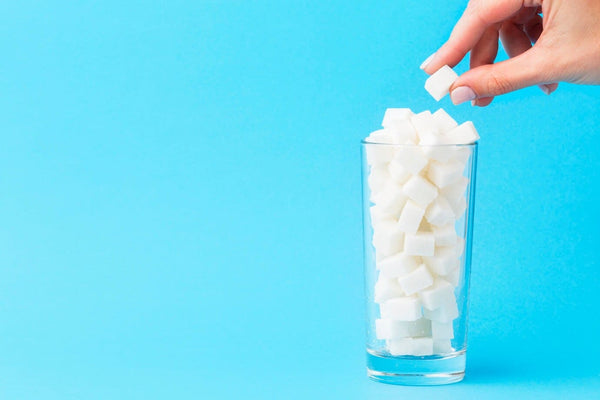Does Oat Milk Spike Blood Sugar?
Oat milk has garnered a lot of attention about its potential impact on blood sugar levels.
We’re here to shed some light on the issue, taking an evidence based approach to the matter.
How much sugar is in oat milk?
Contrary to what you may have heard, oat milk isn't laden with sugar and typically contains 2 to 4 grams per 100ml.
In comparison, cow's milk contains 5 grams of sugar per 100ml.
However, this is not the whole story, and other factors impact blood sugar response.
The presence of other carbohydrates like fibre & starch also play a role, as these are converted to sugars in the body.

Evidence based approach
To better understand oat milk's impact on blood sugar, we need to look at its glycemic index (GI) and glycemic load (GL).
These are essentially scoring systems to help classify food based on its blood sugar response.
Glycemic Index vs. Glycemic Load
Glycemic index (GI) measures how quickly carbohydrate containing foods raise blood sugar.
Glycemic load (GL) takes into account both the quality and quantity of carbohydrates consumed.
Glycemic load is a better indicator as it more accurately represents a food's actual effect on blood sugar levels.
Glycemic index (GI) categories
⬇️ Low GI: 55 or less
➡️ Medium GI: 56 to 69
⬆️ High GI: 70+
Glycemic load (GL) categories
⬇️ Low GL: 10 or less
➡️ Medium GL: 11 to 19
⬆️ High GL: 20+
A lower GI and GL is less likely to spike blood sugar levels
What is the glycemic index (GI) of oat milk?
Oat milk has a glyecmic index (GI) of 61±8, which puts it in the medium category.
This is a similar GI to foods like muesli, couscous and sweet potato.
What is the glycemic load (GL) of oat milk?
✅ Oat milk (100ml) has a glycemic load of 4, this puts it in the low category.
✅ Oat milk (250ml) has a glycemic load of 9, this puts it in the low category
This evidence suggests that while oat milk may moderately raise blood sugar levels, its impact is comparable to that of cow's milk and other common foods.
Oat milk vs. fizzy drinks
Some articles have compared oat milk’s blood sugar response to fizzy drinks.
The evidence suggests this is not true.
A 250ml serving of fizzy drink (e.g. Coca-Cola) has a GL of 17, almost double that of oat milk.
In addition, whilst fizzy drinks are almost exclusively sugar, oat milk contains other nutrients like fibre, protein, fats & vitamins.
What about zero-sugar oat milk?
While some oat milk varieties are marketed as sugar-free, they usually contain the same level of total carbohydrates as regular oat milk .
Consequently, once these carbohydrates are broken down by the body, they still impact blood sugar levels in a similar way to regular oat milk.
Conclusion
In conclusion, while oat milk does raise blood sugar levels (like all foods), its overall impact on blood sugar levels is considered low/medium based on GL & GI data.
It's also important to take into account serving sizes. For example a splash of oat milk in your tea or coffee only equates to 5ml, and so is likely to have a minimal affect on blood sugar.
In contrast, if you were to gulp down a whole litre of oat milk then your blood sugar would clearly increase more.
Individuals with specific dietary concerns should always consult healthcare professionals to determine the best choices for their health needs.
Oat Milk Powder
With Overherd oat milk powder, you can adjust the amount of carbs and sugar in your oat milk by varying the water to powder ratio.
It's also higher in fibre than other oat milk which helps regulate blood sugar levels.
